

Free Jung Personality Test (similar to MBTI / Myers Briggs) Personality Test Results. Temperament Theory Explains "The Why" We Behave The Way We Do. Keys 2 Cognition - Cognitive Processes. SCUEI - Global 5 Type Descriptions. SCUAI - Global 5 Type Descriptions. Global 5/Big 5 to Jung/MBTI/Kiersey correlations. Keys 2 Cognition - Cognitive Processes. In the 1920s, Swiss psychiatrist Carl Jung identified four essential mental functions—today known as cognitive processes.
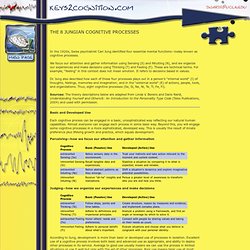
We focus our attention and gather information using Sensing (S) and iNtuiting (N), and we organize our experiences and make decisions using Thinking (T) and Feeling (F). These are technical terms. For example, “feeling” in this context does not mean emotion. It refers to decisions based in values. Dr. Sources: The theory descriptions below are adapted from Linda V.
Basic and Developed Use Each cognitive process can be engaged in a basic, unsophisticated way reflecting our natural human capabilities. Perceiving—how we focus our attention and gather information Judging—how we organize our experiences and make decisions According to Jung, development is more than basic or developed use of processes in isolation. Sixteen Thematic Patterns. Colour Psychology. ENFP. Check Your Personal Thinking Style. Personality Test. ENFP. This article is about the Myers-Briggs personality type.
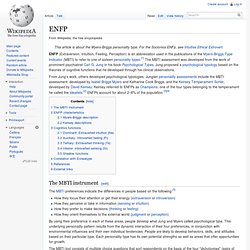
For the Socionics ENFp, see Intuitive Ethical Extrovert. ENFP (Extraversion, Intuition, Feeling, Perception) is an abbreviation used in the publications of the Myers-Briggs Type Indicator (MBTI) to refer to one of sixteen personality types.[1] The MBTI assessment was developed from the work of prominent psychiatrist Carl G. Jung in his book Psychological Types. Jung proposed a psychological typology based on the theories of cognitive functions that he developed through his clinical observations.
The MBTI instrument[edit] The MBTI preferences indicate the differences in people based on the following:[5] By using their preference in each of these areas, people develop what Jung and Myers called psychological type. The MBTI tool consists of multiple choice questions that sort respondents on the basis of the four "dichotomies" (pairs of psychological opposites). Champion (role variant) The Champion Idealist is one of the 16 role variants of the Keirsey Temperament Sorter,[1] a self-assessed personality questionnaire designed to help people better understand themselves.
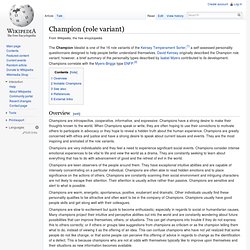
David Keirsey originally described the Champion role variant; however, a brief summary of the personality types described by Isabel Myers contributed to its development. Champions correlate with the Myers-Briggs type ENFP.[2] Champions are introspective, cooperative, informative, and expressive. Champions have a strong desire to make their thoughts known to the world. When Champions speak or write, they are often hoping to use their convictions to motivate others to participate in advocacy or they hope to reveal a hidden truth about the human experience.
Champions are very individualistic and they feel a need to experience significant social events. Champions are keen observers of the people around them. Champions are warm, energetic, spontaneous, positive, exuberant and dramatic. Keirsey Temperament Sorter. Heading text[edit] The Keirsey Temperament Sorter (KTS) is a self-assessed personality questionnaire designed to help people better understand themselves and others.
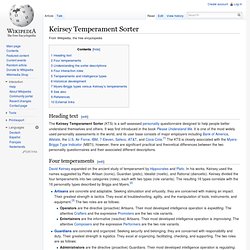
It was first introduced in the book Please Understand Me. It is one of the most widely used personality assessments in the world, and its user base consists of major employers including Bank of America, Allstate, the U.S. Air Force, IBM, 7-Eleven, Safeco, AT&T, and Coca-Cola.[1] The KTS is closely associated with the Myers-Briggs Type Indicator (MBTI); however, there are significant practical and theoretical differences between the two personality questionnaires and their associated different descriptions. Four temperaments[edit] David Keirsey expanded on the ancient study of temperament by Hippocrates and Plato. Careers for ENFP Personality Types.
Whether you're a young adult trying to find your place in the world, or a not-so-young adult trying to find out if you're moving along the right path, it's important to understand yourself and the personality traits which will impact your likeliness to succeed or fail at various careers.
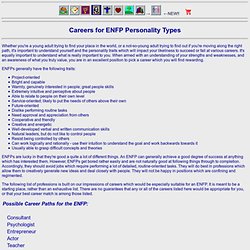
It's equally important to understand what is really important to you. When armed with an understanding of your strengths and weaknesses, and an awareness of what you truly value, you are in an excellent position to pick a career which you will find rewarding. ENFPs generally have the following traits: ENFPs are lucky in that they're good a quite a lot of different things. An ENFP can generally achieve a good degree of success at anything which has interested them. ENFP Profile. Extraverted iNtuitive Feeling Perceiving by Marina Margaret Heiss Profile: ENFP Revision: 4.0 Date of Revision: 28 Feb 2011 [The following comes partially from the archetype, but mostly from my own dealings with ENFPs.]
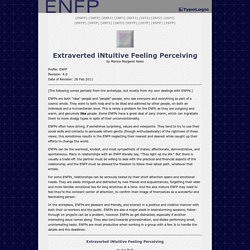
ENFP Relationships. ENFPs take their relationships very seriously, but also approach them with a childlike enthusiasm and energy.
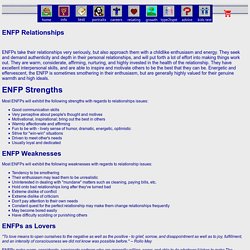
They seek and demand authenticity and depth in their personal relationships, and will put forth a lot of effort into making things work out. They are warm, considerate, affirming, nurturing, and highly invested in the health of the relationship. They have excellent interpersonal skills, and are able to inspire and motivate others to be the best that they can be.
Energetic and effervescent, the ENFP is sometimes smothering in their enthusiasm, but are generally highly valued for their genuine warmth and high ideals. Most ENFPs will exhibit the following strengths with regards to relationships issues: Most ENFPs will exhibit the following weaknesses with regards to relationship issues: Tendency to be smothering Their enthusiasm may lead them to be unrealistic Uninterested in dealing with "mundane" matters such as cleaning, paying bills, etc.